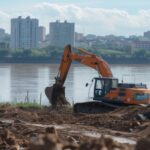The moment when Salud Carbajal challenged Pete Hegseth captured the attention of millions because it was not just a heated exchange but also a reflection of the country’s political struggle. Carbajal raised an important question about whether loyalty to a political leader should define service to the nation. Hegseth’s refusal to give a clear answer sparked controversy and debate in Congress and in public discussions. Their confrontation became symbolic of the larger question about what it means to serve the country faithfully. It also highlighted the clash between two very different approaches to leadership. Carbajal stood firmly behind the Constitution and democratic traditions while Hegseth emphasized a vision shaped by patriotism and loyalty to leadership. This introduction sets the stage for a deeper understanding of who these two men are, what led to their clash and why their debate is significant for the future of democratic governance.
Background of Salud Carbajal
Salud Carbajal’s personal story is deeply tied to his political career. Born into an immigrant family, he experienced firsthand the struggles of working-class communities and this shaped his view on fairness and opportunity. His background gave him a strong foundation in understanding how government decisions affect ordinary families. After serving in the military, Carbajal entered public life with a commitment to accountability and service. His path reflects not just ambition but also resilience in navigating challenges that shaped his political mission.
Carbajal’s upbringing is an essential piece of his leadership identity. He often connects his early life to his views on protecting democratic values and holding leaders accountable. His voice in Congress carries a message of responsibility where leadership must always put country before self. He has consistently worked on issues related to veterans, defense, and community development. This has made him not only a representative of his district but also a national figure known for standing firm when principles are at stake.
| Aspect of Background | Description | Influence on Leadership |
| Family Roots | Immigrant parents, working-class background | Shaped his belief in fairness and accountability |
| Military Service | Served in the Marine Corps | Built his sense of discipline and duty |
| Community Ties | Deep involvement in California’s Central Coast | Strengthened his focus on local concerns in national debates |
| Political Values | Commitment to democratic integrity | Guides his approach to questioning authority |
Political Career and Public Image of Carbajal
Over the years, Carbajal has developed a reputation as a leader who is not afraid to confront authority when he feels democratic principles are at risk. His political career has been marked by his service on committees that deal with national defense and veterans’ affairs. These roles have placed him in direct discussions with defense leaders, giving him both influence and responsibility in shaping key policies. Carbajal’s approach is defined by accountability which resonates with many who believe leaders should be answerable to the people they serve.
His public image is built on being straightforward and principled. While some critics argue that his style can sometimes be confrontational, supporters view it as necessary in an age when clarity is often avoided in politics. He is known to challenge individuals who attempt to blur lines between loyalty to political figures and loyalty to the Constitution. That image became even more pronounced during his clash with Pete Hegseth.
| Political Role | Focus Area | Public Perception |
| Committee Work | Defense, veterans, accountability | Seen as knowledgeable and duty-driven |
| Public Statements | Clear stance on loyalty and governance | Viewed as principled and outspoken |
| Image in District | Advocates for local communities | Trusted by many constituents |
| National Recognition | Known for strong questioning in hearings | Respected for directness though polarizing |
This structured view highlights how Carbajal’s career is closely tied to defending democratic standards. His public identity is a mixture of community service, strong oversight, and firm adherence to constitutional principles.
Who is Pete Hegseth ?
Pete Hegseth is a figure who rose to prominence through a combination of military service and media presence. His background as a U.S. Army veteran gave him credibility among conservatives who value strong military leadership. Later, his career as a television commentator gave him a platform to shape national conversations about patriotism and values. This combination of military service and media visibility eventually led him into a high-profile political role where he continues to attract both support and criticism.
Hegseth’s image is tied closely to his ability to connect with audiences on emotional themes like loyalty, unity, and patriotism. For his supporters, he represents strength and conviction in an age when many leaders avoid clear positions. For his critics, he represents a growing trend where loyalty to individuals takes precedence over loyalty to democratic institutions. His leadership style reflects this tension, making him a polarizing figure who inspires loyalty but also raises concern about institutional balance.
Transition from Media Personality to Defense Secretary
Hegseth’s move from television personality to Defense Secretary illustrates the changing landscape of American politics where visibility often outweighs traditional qualifications. His military background made him a credible choice for a defense role but his political and media identity added layers of controversy. Supporters argue that his straightforward and bold communication style makes him relatable and inspiring. Critics contend that leadership in defense requires measured judgment and nonpartisan clarity which they believe he does not consistently display.
This unusual career path demonstrates how political appointments are influenced not just by experience but also by public recognition. The rise of Hegseth underscores the power of media exposure in shaping political futures. His leadership style carries traits of both his military discipline and his television persona which emphasizes strong opinions and clear loyalty. This unique blend makes him stand out but also fuels debate over whether it strengthens or undermines the institution he leads.
| Career Stage | Description | Impact on Leadership |
| Military Service | Served in Iraq and Afghanistan | Built credibility and discipline |
| Media Career | Television commentator on political issues | Enhanced public visibility and influence |
| Political Role | Defense Secretary | Brought controversy over balance of loyalty and governance |
| Public Image | Seen as outspoken and patriotic | Polarizing across political lines |
The Heated Exchange Between Carbajal and Hegseth
The sharp exchange between Salud Carbajal Pete Hegseth occurred in a high-profile setting where issues of loyalty and governance were under discussion. Carbajal pressed Hegseth to answer directly whether allegiance to a political figure should be considered a requirement for national service. Hegseth avoided a direct response which escalated the tension. Carbajal then accused him of being unfit to lead, expressing frustration at what he viewed as a dangerous unwillingness to affirm constitutional principles.
This moment captured national attention because it symbolized the clash between two very different interpretations of duty. Carbajal’s frustration represented the perspective that loyalty must be to the Constitution above all else. Hegseth’s hesitation was seen by critics as signaling a willingness to place individual loyalty above institutional responsibility. For supporters of Hegseth however, his refusal to give a direct answer was viewed as a principled stand against political traps. The clash reflected the deep polarization within national politics.
The Role of Loyalty in National Service
Loyalty is a central theme in the debate between Carbajal and Hegseth. At its core, the question is whether loyalty should be directed to individuals or to institutions. Carbajal insists that true service requires loyalty to the Constitution and democratic principles. Hegseth’s approach, however, resonates with people who see loyalty to a leader as essential for unity. This tension is not new in American history but it has grown sharper in recent years as partisanship intensifies.
The broader question is how democratic societies should define loyalty in public service. If leaders prioritize loyalty to political figures, then institutions risk losing their integrity. If loyalty remains rooted in constitutional principles, institutions are more likely to maintain their strength even during times of political division. The Carbajal-Hegseth exchange highlights how unresolved this issue remains and how it continues to shape the expectations citizens have for their leaders.
Partisan Divisions in U.S. Defense Policies
The Carbajal and Hegseth confrontation also highlights how defense policies are now deeply influenced by partisan divisions. Defense was once an area where bipartisan agreement was more common, yet today it is heavily shaped by political loyalties. This shift has led to greater scrutiny of those who lead defense institutions. Carbajal’s challenge reflects the belief that clarity and accountability are needed more than ever in such a divided environment. Hegseth’s stance illustrates how partisan perspectives influence the way leaders are judged and supported.
| Policy Area | Traditional View | Current Divisions |
| Military Loyalty | Loyalty to Constitution and nation | Often framed through loyalty to political figures |
| Defense Oversight | Bipartisan cooperation common | Increasingly partisan debates |
| Leadership Standards | Based on experience and service | Now influenced by political alignment |
| Public Trust | Built on nonpartisan service | Fragmented by political polarization |
Public Reactions and Media Coverage
Public reaction to the exchange was immediate and divided. Supporters of Carbajal praised his insistence on constitutional duty and his courage to call out what they saw as dangerous ambiguity. Hegseth’s defenders applauded him for not allowing himself to be cornered by politically charged questions. The media amplified both sides, ensuring that the confrontation became part of the national conversation. This widespread coverage ensured that the debate was not just confined to Congress but was discussed across households, workplaces, and community forums.
The coverage revealed how deeply the public is divided on issues of loyalty and governance. For some, Carbajal represented the voice of accountability. For others, Hegseth represented the strength of conviction. The clash revealed how even a single moment in a hearing can shape broader narratives about democracy, leadership, and trust. Media outlets played a key role in ensuring that this was not just a passing exchange but a central event in political discourse.
Implications for Democratic Governance
The clash carries significant implications for how democratic governance is understood. At its core, it underscores the importance of accountability and clarity in leadership. Leaders who avoid direct answers risk undermining public trust, while those who insist on clarity may face criticism for being confrontational. The balance between these approaches defines the health of democratic institutions.
This moment is a reminder that governance is not only about policies but also about principles. Loyalty to the Constitution safeguards the integrity of institutions. Loyalty to individuals risks weakening those safeguards. The Carbajal-Hegseth exchange serves as a warning that the strength of democracy depends on leaders who are willing to affirm their duty to the nation’s foundational values. It also highlights the responsibility of citizens to demand accountability and transparency from those in power.
Comparative Leadership Styles of Carbajal and Hegseth
Salud Carbajal Pete Hegseth represent two contrasting styles of leadership that reflect the broader divide in American politics. Carbajal emphasizes accountability and democratic integrity, often challenging authority figures when he believes they are compromising principles. Hegseth emphasizes loyalty, conviction, and patriotism, drawing heavily from his military background and media experience. These differences explain why their confrontation was so intense and why it resonated with the public.
| Leader | Core Style | Strengths | Criticisms |
| Salud Carbajal | Accountability-based | Strong advocate for constitutional duty | Sometimes viewed as confrontational |
| Pete Hegseth | Loyalty and conviction-based | Appeals to patriotism and unity | Criticized for blurring loyalty with partisanship |
This comparison shows how their contrasting styles reflect different visions of leadership. Salud Carbajal Pete Hegseth style speaks to those who prioritize institutional integrity while Hegseth’s approach speaks to those who value strong personal conviction. Both have strengths and weaknesses which were revealed during their heated exchange.
Broader Lessons for American Politics
The Salud Carbajal Pete Hegseth episode offers valuable lessons about leadership and the future of American politics. It highlights the importance of maintaining loyalty to constitutional principles even in times of division. It also shows how partisan polarization can shape not only public debate but also the very definition of service and duty. For citizens, this moment is a reminder of the importance of staying engaged and holding leaders accountable.
For policymakers, it is a lesson in the dangers of placing personal loyalty above democratic institutions. Leaders must prioritize clarity, accountability, and transparency if they are to safeguard democracy. This episode will likely be remembered as more than just a confrontation between two individuals. It is a mirror of the deeper challenges facing the nation and a call to action for leaders and citizens alike to reaffirm their commitment to democratic values.
Conclusion
The confrontation between Salud Carbajal Pete Hegseth is a defining political moment that reflects the tension between loyalty to individuals and loyalty to the Constitution. It highlighted contrasting leadership styles, sparked national debate, and revealed how deeply divided the country has become. For Carbajal, the clash was about accountability and constitutional duty. For Hegseth, it was about loyalty and conviction. The broader lesson is clear democracy depends on leaders who put principles above personal allegiance. This episode will continue to resonate as a reminder of what is at stake in American politics.
FAQs
1. Who is Salud Carbajal ?
Salud Carbajal is a U.S. Representative from California known for his focus on defense, veterans’ affairs and democratic integrity.
2. Who is Pete Hegseth ?
Pete Hegseth is a former military officer and television commentator who became Defense Secretary and is known for his emphasis on loyalty and patriotism.
3. What was the main issue in the Carbajal-Hegseth exchange ?
The main issue was whether loyalty to a political leader should be considered a requirement for serving the nation, with Carbajal pressing for constitutional loyalty and Hegseth refusing to give a direct answer.
4. Why was the exchange significant ?
The exchange was significant because it reflected broader partisan divisions and raised questions about the meaning of loyalty in public service.
5. What lessons can be drawn from the clash ?
The lesson is that democratic governance depends on leaders who prioritize constitutional principles over personal or partisan loyalty.







